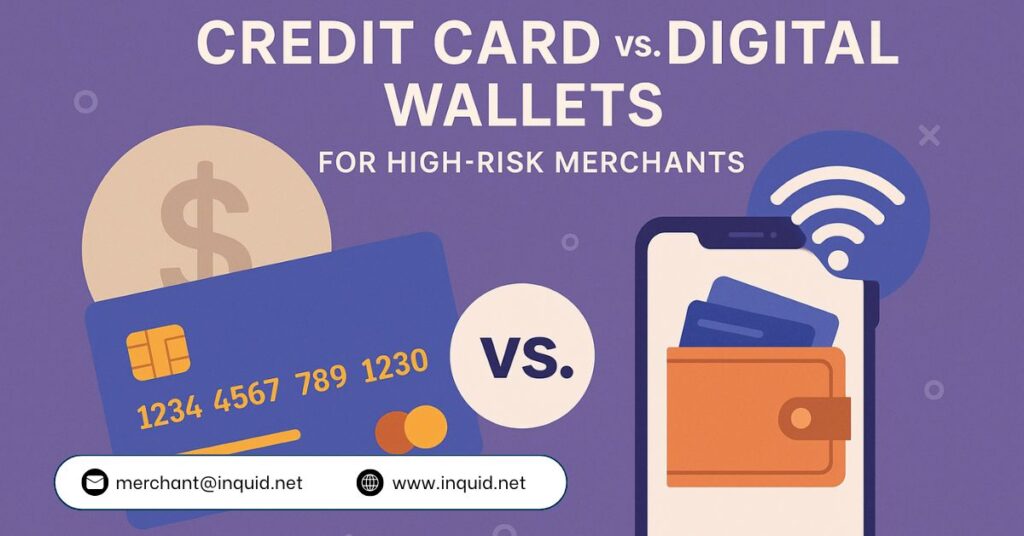
Finding the right way to accept payments is never easy for high-risk businesses. With banks, processors, and platforms constantly adjusting their policies, merchants in industries like gaming, adult content, forex, or online consulting are often left comparing options that may not even work for them long term. One of the most common comparisons is credit card vs digital wallets, each offering different pros and cons for high-risk use cases.
This blog breaks down both options, compares them in real business scenarios, and explains which might be better depending on your market, audience, and risk level.
Why High-Risk Merchants Need to Be Careful with Payment Methods
If your business operates in a high-risk space, the wrong payment setup can mean higher fees, sudden shutdowns, or frozen funds. Credit card processors and digital wallet platforms both come with their own rules and restrictions. Some will reject your application upfront. Others will approve it, only to cut ties later if your chargebacks rise or your content raises concerns.
For merchants in this space, choosing a method is not just about preference. It’s about survival.
How Credit Card Processing Works for High-Risk Businesses
Credit card processing still remains one of the most common ways to accept payments online. For high-risk merchants, though, getting approved often means working with specialized providers who understand the business model.
These processors typically offer custom underwriting, chargeback prevention tools, and support for multiple currencies. But approval takes longer, fees are higher, and rolling reserves are common.
To get a full breakdown, check out this guide on high-risk credit card processing.
If your market is international, you may also benefit from using processors that allow you to accept credit card payments globally. That flexibility is critical for forex, gaming, or other cross-border industries.
How Digital Wallets Fit Into the Picture
Digital wallets like Apple Pay, Google Pay, Skrill, or even crypto-based options have become popular with users who want faster checkout or more privacy. From a user experience perspective, wallets are often quicker and more convenient. But for high-risk businesses, the integration is not always smooth.
Some wallet providers refuse to work with adult, betting, or forex companies. Others only support certain regions or require complicated compliance checks. Still, when available, the comparison of credit card vs digital wallets becomes important, as wallets can help merchants lower decline rates and offer more payment flexibility.
This is especially true for businesses selling in multiple regions. More detail on that can be found in this blog on alternative payment methods for international businesses.
Comparing Credit Cards and Wallets: What Really Matters
Here are a few key areas where credit cards and digital wallets differ:
| Factor | Credit Card Processing | Digital Wallets |
|---|---|---|
| Approval for high-risk | Requires specialized providers | Often restricted for high-risk sectors |
| Chargeback handling | Strong tools available | Fewer tools, higher dispute sensitivity |
| Global reach | Widely accepted across markets | Varies by region and provider |
| Integration | Supported by most platforms | May need separate modules or APIs |
| Fees | Higher for high-risk accounts | Usually lower, but fewer protections |
There is no single winner across all points. Some businesses may find cards more stable. Others may rely on wallets to reach specific markets or user groups.
When to Use Both
High-risk merchants often benefit most from combining options. Offering credit card payments alongside a few trusted digital wallets gives your users choice and gives you fallback options in case one channel fails.
It also helps reduce friction at checkout. Some users simply prefer not to use their cards for sensitive purchases. In that case, alternative methods can help drive conversions.
For a full list of options, this guide on alternative payment methods to grow your sales is worth reviewing.
Final Thought
Credit card processing and digital wallets each come with strengths and weaknesses. High-risk merchants should look at both options based on how their business operates, where their customers are located, and what level of risk they can manage.
Relying on just one channel is rarely safe in this space. The more flexible your payment system is, the better your chances of staying active and getting paid.
FAQs
Which payment method is safer for high-risk businesses?
Credit card processing often offers better chargeback management and dispute handling, but requires more effort to get approved.
Do digital wallets support adult or gaming platforms?
Some do, but many mainstream wallets block or restrict these industries. You’ll need to check terms before integrating.
Can I use both cards and wallets together?
Yes, many high-risk merchants combine both to increase acceptance rates and offer more options to users.
